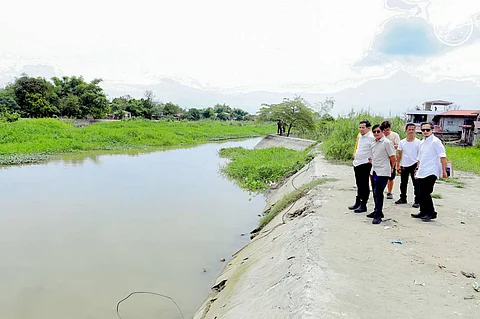
- NEWS
- the EDIT
- COMMENTARY
- BUSINESS
- LIFE
- SHOW
- ACTION
- GLOBAL GOALS
- SNAPS
- DYARYO TIRADA
- MORE

The Commission on Audit (CoA) has obtained the first batch of documents crucial to its impending investigation into the flood control projects in Bulacan, which received the biggest funds in Central Luzon at P44 billion.
State auditors, accompanied by a law enforcement group, personally retrieved the documents from the district engineering office of the Department of Public Works and Highways (DPWH) in Malolos on Tuesday.
The documents were quickly forwarded to the CoA Central Office in Quezon City for review.
This follows President Ferdinand Marcos Jr.’s directive of a nationwide review of all flood control projects implemented in the past three years, particularly those found to be defective, amid the country’s severe flooding crisis.
The DPWH is conducting its own probe, even as CoA Chairperson Gamaliel Cordoba has ordered a separate fraud audit in Bulacan, which received the bulk of the P98 billion flood control funds for Central Luzon.
Bulacan, among the country’s top 10 flood-prone provinces, recorded the most flood control projects from July 2022 to May 2025 — 668 in total — worth P44 billion.
Despite the huge funding, Bulacan has remained prone to floods, sparking suspicions of substandard work and corruption.
“The retrieval of these critical documents marks a pivotal step, enabling CoA to proceed with its meticulous examination of project existence, quality, cost reasonableness, and procurement processes in Bulacan,” the CoA said.
The special audit aims to “identify and substantiate instances of fraud, waste, and mismanagement,” it added.
The Marcos administration has spent over P500 billion on flood control projects since the start of the President’s term in July 2022.
With 1,617 projects, Central Luzon (Region 3) topped the list with the highest number of flood control programs since 2022, followed by the National Capital Region with 1,058 projects amounting to P52.57 billion. The Bicol Region (Region V) placed third with 866 projects worth P49.61 billion.
Over the years, the government has poured trillions of pesos into flood control projects under the DPWH. In the 2025 budget, the agency received the second-largest budget at P1.007 trillion, next to the education sector at P1.055 trillion.
Still, the agency has struggled to resolve the country’s flooding woes, pointing to climate change as a factor.
In his fourth State of the Nation Address in late July, Marcos slammed overpriced and substandard flood control projects, warning lawmakers that no one would be spared if found linked to corruption.
Senator Panfilo Lacson earlier claimed that 67 House members in the previous Congress had control over the project funds because either they or their relatives were the contractors for the government’s flood mitigation program.
Baguio City Mayor Benjamin Magalong likewise alleged that lawmakers were taking 30 to 40 percent in kickbacks from flood control and infrastructure projects.
